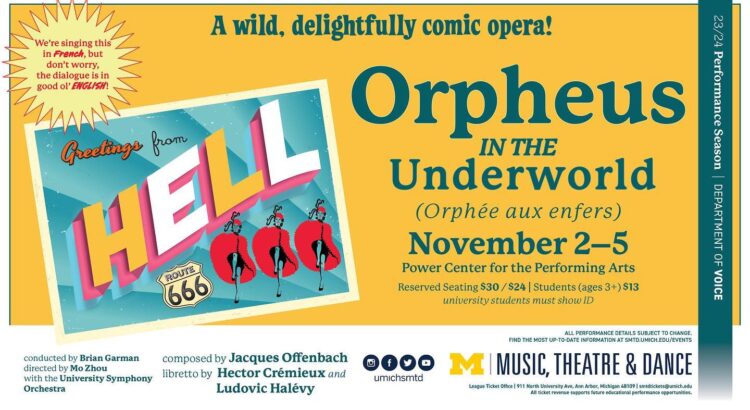8:00pm • Saturday, Nov. 4, 2023 • Power Center
SMTD’s production of Orpheus in the Underworld (Orphée aux enfers) this past weekend was campy and aesthetically chaotic. The opera was originally written in 1858 by librettists Hector Crémieux and Ludovic Halévy and composer Jacques Offenbach, and is a humorous, irreverent take on the Greek myth of Orpheus and Eurydice. In this rendition, directed by Mo Zhou, SMTD chose to extend the opera’s original political critique of capitalist power structures into the 1950s, on the cusp of the Kennedy presidential campaign. The result is a complex amalgam of messages and meanings which I will discuss below.
The notes provided in the program for this performance were essential in interpreting the many points the creative directors wanted to get across. First, the “About the Authors” section conveyed the point that each of the authors drew inspiration from the politics of their time. Mo Zhou elaborated upon that point in her director’s note, drawing from Offenbach’s “turbulent relationship with personal finance” to develop the opera as a statement on the privileged elite and capitalism. Further, the dramaturgical team focuses on how including Public Opinion as an archetypal character frames and translates the plot for the audience. Finally, the dramaturgs suggest that Offenbach wrote feminist meanings into the opera and subverted power structures by making Public Opinion a female character and focusing on Eurydice’s romantic self-determination.
I would not necessarily have read all of these themes into the opera without the program to point them out. In terms of the political and labor meanings of the production, the set did much of the heavy lifting. Larger-than-life vintage advertisements framed the stage, literally presenting each scene through a lens of consumerism. In the scene where the gods revolt against Jupiter’s rule, they carry signs parodying the labor movement with slogans like “Give Me Generational Wealth or Give Me Debt.”
Despite the dramaturgical efforts to read feminism and liberation into Orpheus in the Underworld, my perception of the gender relations in this story was more cynical. While the role of Public Opinion as a female character was meant to give “the voice of the collective Greek chorus … to someone who historically was not given a voice,” her comparatively minor role in the story didn’t allow a full development of that voice. Personally, Offenbach’s treatment of Public Opinion as a female character felt more mocking of women as arbiters of social control.
All of that said, this performance was a lot of fun to experience, with all of its wacky, unexpected pop-culture references (Elvis as Bacchus?). There was so much going on that I don’t know if my confusion is a critique or a sign of some complex theatrical genius on the side of the production’s creative team. The set and costumes were beautifully and thoughtfully designed, and the cast performed splendidly. Orpheus in the Underworld was both entertaining and intellectually stimulating, and I thoroughly enjoyed picking apart the creative choices which pulled this performance together.


